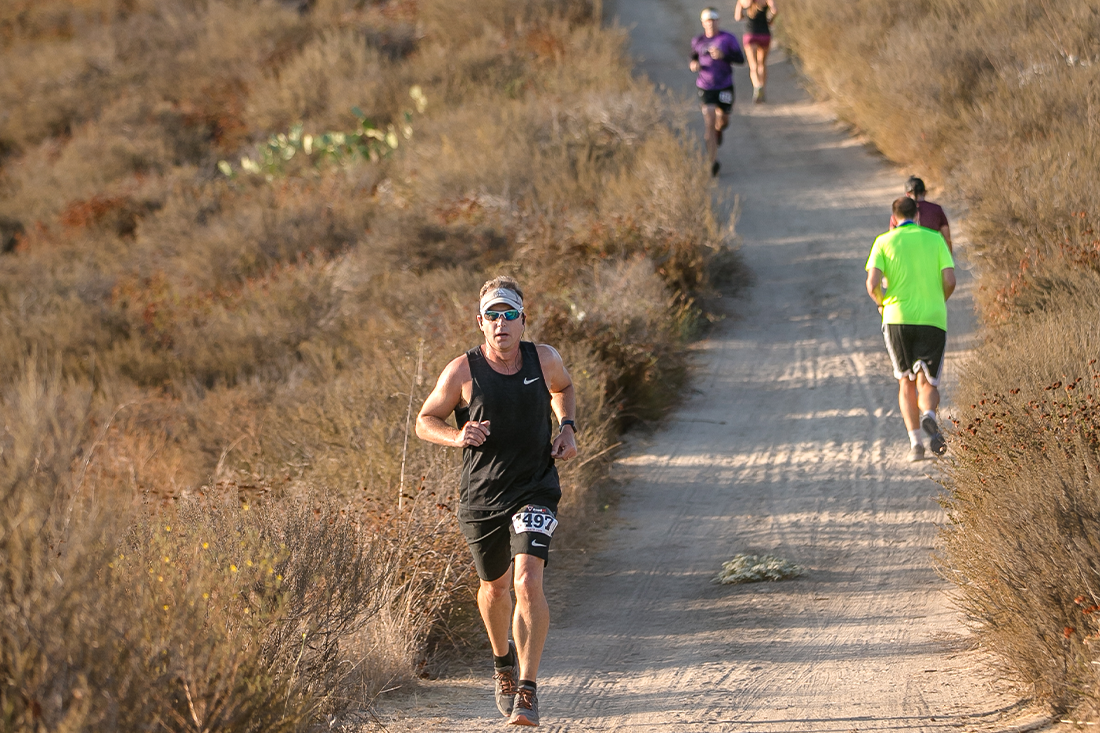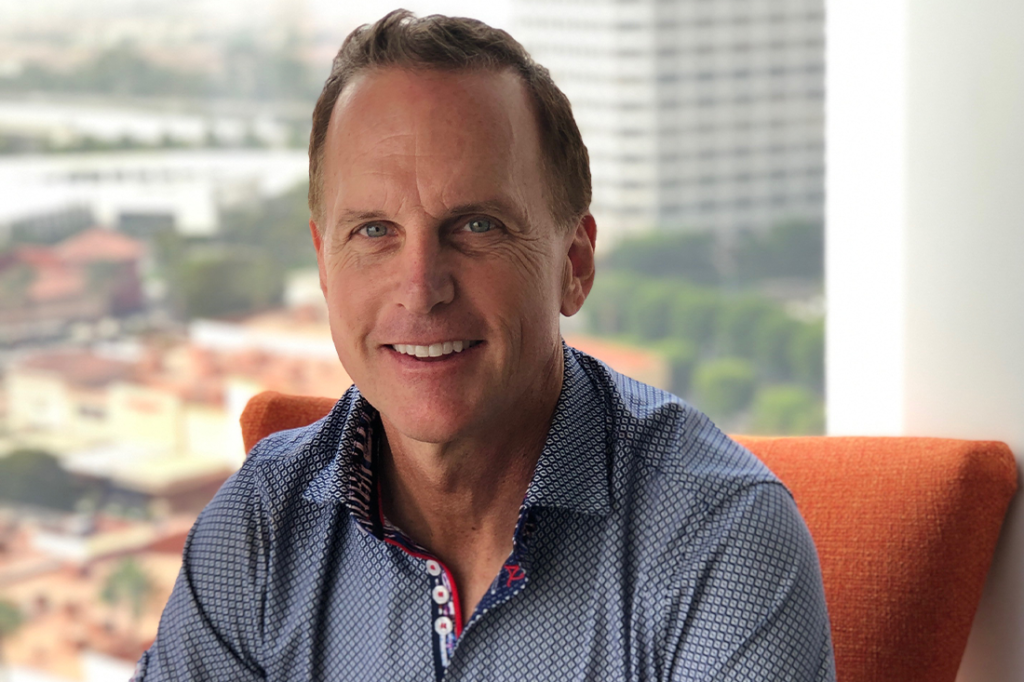There’s a moment during a long distance run when the body begins to beg for mercy. It’s then, as the muscle cramps and exhaustion take hold, that runners have a choice to make: quit or keep going.
For Chuck Goetschel, an extreme runner and serial entrepreneur, that “hitting the wall” feeling has become an integral part of his success both on and off the racetrack.
“If I’m running a 24-hour race, after four hours of running, your feet hurt and your legs hurt and you’re tired and want to stop,” Goetschel says. “So how you do run for 20 more hours? You come head-to-head with yourself. You have a battle.”
The key is choosing those battles, rather than waiting for them to come to you. Goetschel, who was recently approved to compete in the Marathon Des Sables, a six-day, 156-mile race in the Sahara Desert nicknamed the Toughest Footrace on Earth, has found that it’s in these grueling moments—when he is forced to supersede the limitations of his mind and body—that he is able to tap into the grit that can only come from experiencing the extreme.
“In the most extreme elements, you get an opportunity to grow yourself and to push to another gear,” he says. “I can’t do that sitting on the couch. Putting myself in those extreme moments gives me a chance to find out how tough I can be internally and to grow that tenacious muscle to a higher level.”

Problems are the answer.
Those muscles have come in handy for Goetschel, who began his entrepreneurial career at age 10 and has since built multiple businesses spanning categories and channels—all of which required extreme perseverance and effort. His experiences have led him to write two books—The Anatomy of a Comeback and Simon Says: Living Your Life Purpose… and Not Just Following the Crowd.
Early in his career and looking to supplement his work as a professional athlete, Goetschel joined a company with a network marketing business model and discovered that the business, in his opinion, was built around an antiquated system. To provide a solution, he assembled a small group of talented team members and built a process that was easy to replicate. His small organization ultimately grew into a $40 million worldwide business, a feat that earned him a spot on the company’s advisory board of directors.
But after a leadership dispute, Goetschel and a few others parted ways with the company. Over the next few weeks, approximately 75,000 distributors followed his lead, and the company sued Goetschel for $100 million—litigation that would tie up his finances and energy for years.
“Building the first big thing is not so bad, but building the second big thing, when you are literally bankrupt and have no money, that’s really hard to pull yourself back up,” he says. “Starting over again with all of that on your back is probably the greater accomplishment.”
Although his first big success resulted in a dire financial situation, it also revealed his two greatest strengths: identifying problems and delegating the solutions to talented people. As he scrambled to get back on his feet, Goetschel says, he went back to basics, asking himself how he could combine his own gifts and passions to create solutions that would help or serve others.
For Goetschel, the answer made his next steps obvious. With a degree in computer science and a heart for entrepreneurship, he launched an online university that taught entrepreneurs how to engage customers during the early days of the internet. Goetschel gathered 30 professors from around the world and the school appeared to be a success.
Then he read the graduates’ exit surveys.
“Almost all the graduates said, ‘Now I know what I should be doing, but I’m still not going to do it,’ ” he says. “I realized, that’s not solving a problem, that’s just knowledge on ice.”
He launched Paradigm Marketing Alliance as a remedy, creating social media content for those entrepreneurs and other franchise brands. The next problem? Creating all of that content was expensive, so Goetschel built Rallio, a social media technology platform, in order to automate numerous processes that were previously manual efforts. The company is also working to take the guesswork out of social media and allow users to pinpoint fine details such as which posts have generated the most revenue by category. Among its existing B2B partnerships is the app NOW, which provides a social selling toolbox for solopreneur users, offering automated sampling and digital commerce solutions.
This pattern of identifying the problems within the problems defines Goetschel’s approach to life and business. It’s not great ideas that change the world or build successful businesses, he believes, but rather problem-solving.
“To come up with an idea is so backwards thinking,” he says. “Stop thinking of ideas and start looking for solutions and for problems to solve. Spend all of your mental energy finding and defining the problem, and then solve it.”
“Don’t be boring.”
Rallio’s culture and operating practices echo Goetschel’s extreme style. Company mugs bear the slogan “Don’t be boring,” and employees are encouraged to take vacation days whenever they like as long as their work gets done. Ping pong tables and office parties are the norm, and company executives are often plucked from obscurity for their talent rather than career pedigree. For example, Rallio employees picked a barista from the Starbucks across the street to join the marketing team as an intern because he made them laugh each morning with his quick wit and humor. Soon his creative approach earned him a position providing entertaining copy to the marketing team and acting in their numerous videos.
“I appreciate loyalty and longevity, but you don’t move up ranks based on the timing of your annual review,” he says. “That’s not the best thing for the whole team. The best thing is for you to be constantly trying to grow and become a better person so that you obviously rise up and are needed at a higher level. Promotions are based on who you are becoming.”
Big picture optimism and an encouraging work environment are important to Goetschel, but so is what he describes as necessary pessimism, a mindset that allows his team to constantly look for what’s missing and anticipate worst-case scenarios.
Living in the tension of these extreme opposites—a fun, inclusive working environment mixed with a heightened sense of what could go wrong—have become Goetschel’s secret sauce.
“We’re looking for extreme people,” Goetschel says. “If you have a collection of extreme people, who are passionate about a vision, something good is going to come out of it.”
This article originally appeared in the January/February 2022 Issue of SUCCESS magazine. Photos by Paksit Photos and courtesy of Chuck Goetschel



